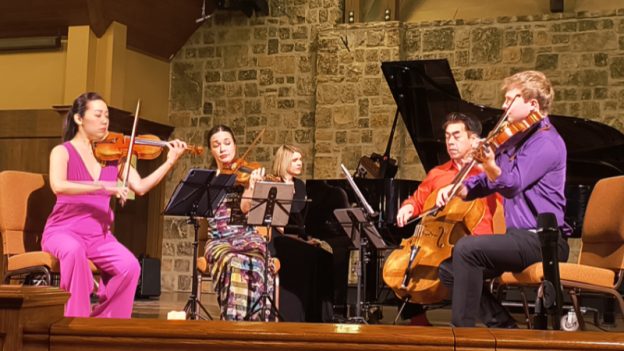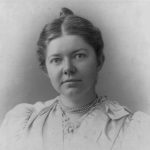Novrmber 1, 2025
Birmingham United Methodist Church
Milton, Georgia – USA
Vega Quartet (Emily Daggett Smith & Jessica Shuang Wu, violins; Joseph Skerik, viola; Guang Wang, cello); Elizabeth Pridgen, piano.
Antonio VIVALDI: Concerto No. 1 in E major, Op. 8, RV 269, “La primavera” (“Spring”) from Le quattro stagioni
Astor PIAZZOLLA: “Verano Porteño” (“Summer”) from Cuatro Estaciones Porteñas
Antonio VIVALDI: Concerto No. 2 in G minor, Op. 8, RV 315, “L’estate” (“Summer”) from Le quattro stagioni
Astor PIAZZOLLA: “Otoño Porteño” (“Autumn”) from Cuatro Estaciones Porteñas
Antonio VIVALDI: Concerto No. 3 in F major, Op. 8, RV 293, “L’autunno” (“Autumn”) from Le quattro stagioni
Astor PIAZZOLLA: “Invierno Porteño” (“Summer”) from Cuatro Estaciones Porteñas
Antonio VIVALDI: Concerto No. 4 in F minor, Op. 8, RV 297, “L’inverno” (“Winter”) from Le quattro stagioni
Astor PIAZZOLLA: “Primavera Porteña” (“Spring”) from Cuatro Estaciones Porteñas
Mark Gresham | 8 NOV 2025
The inaugural season opener of Music Milton on November 1, 2025, at Birmingham United Methodist Church in Milton, Georgia, brought together sterling musicianship, a fresh program concept, and a genuinely inviting venue experience.
The evening’s ensemble, the Vega Quartet (Emily Daggett Smith & Jessica Shuang Wu, violins; Joseph Skerik, viola; Guang Wang, cello) joined by pianist Elizabeth Pridgen, delivered a thoughtful pairing of Antonio Vivaldi’s Four Seasons (“Le quattro stagioni”), arranged for string quartet, with Astor Piazzolla’s Four Seasons of Buenos Aires (“Las Cuatro Estaciones Porteñas”) in a version for piano trio. The conceptual symmetry—moving through “spring” to “winter” from Vivaldi, interleaved with Piazzolla’s own seasonal cycle—offered both familiarity and fresh context.
Pairing the two sets of “Seasons” has become increasingly common in recent years, in both orchestral and chamber arrangements. However, this program’s structure—interleaving Vivaldi and Piazzolla movement by movement rather than presenting each cycle in full—proved notably more imaginative. Instead of placing one complete set on either side of an intermission, the performance invited listeners to experience shifting climates and stylistic perspectives in close succession, heightening not only the contrast between Baroque brightness and tango-inflected modernism but also the difference in instrumental texture, as the string quartet for Vivaldi alternated with the piano-inflected trio for Piazzolla.
The interleaved structure also created a practical balance in the deployment of the musicians. In the Vivaldi concertos, Smith and Wu alternated the first-violin (solo) and second violin roles from piece to piece, while in the Piazzolla selections, one violinist stepped out to accommodate the piano trio configuration. Skerik remained in the group only for the Vivaldi works, and Pridgen joined only for the Piazzolla. Cellist Wang, however, performed in every piece, serving as a consistent sonic anchor across the entire program.

Emily Daggett Smith, Elizabeth Pridgen, and Guang Wang, perform “Summer” from Piazzolla’s ‘Four Seasons.of Buenos Aires.’ (credit: Mark Gresham)
Across the alternating Vivaldi and Piazzolla selections, the ensemble maintained a cohesive sound and a clear sense of dramatic pacing. Vivaldi’s concertos were shaped with buoyant articulation and well-judged tempos, allowing the baroque lines to speak with clarity and lift. Each subsequent Piazzolla movement introduced a shift in color and rhythmic inflection, with the piano adding a distinctive edge and the strings adapting fluidly to the tango-infused style. Dynamic contrasts were handled with collective assurance. By the concert’s close, the group had drawn a persuasive arc across both cycles, ending in unified, resonant ensemble balance that earned enthusiastic applause.
Acoustically, Birmingham United Methodist Church, new to this reviewer’s concert listening map, provided a pleasing blend of clarity and warmth, served the program exceedingly well; the semicircular seating arrangement also facilitated a sense of inclusion rather than distancing, an important factor given that Music Milton is a new presenter in North Fulton County. According to the organization’s website, Music Milton is “bringing world-class music … to Milton and its neighbouring communities of Alpharetta, Roswell, Johns Creek and beyond.”
As a new presenter, Music Milton made a strong initial impression. The choice of repertoire was both accessible (everyone knows The Four Seasons) and adventurous (pairing it with Piazzolla in an interleaved arc invites inquiry). The professionalism of the artists, combined with the comfortable yet acoustically capable venue, resulted in a concert that felt both polished and engaging.
In summary, this Music Milton first-season opening event offered a vibrant, musically compelling evening. The Vega Quartet and Elizabeth Pridgen, familiar to Atlanta area audiences, proved themselves up to the task; the church venue acquitted itself admirably; and the new local presenter laid a promising foundation in the classic chamber music sphere for North Fulton County. ■
EXTERNAL LINKS:
- Music Milton: musicmilton.org
- Vega Quartet: vegaquartet.com
- Elizabeth Pridgen: lpr.com/lpr_artists/elizabeth-pridgen-piano/
- Birmingham United Methodist Church: birminghamumc.org

Read more by Mark Gresham.







.png)